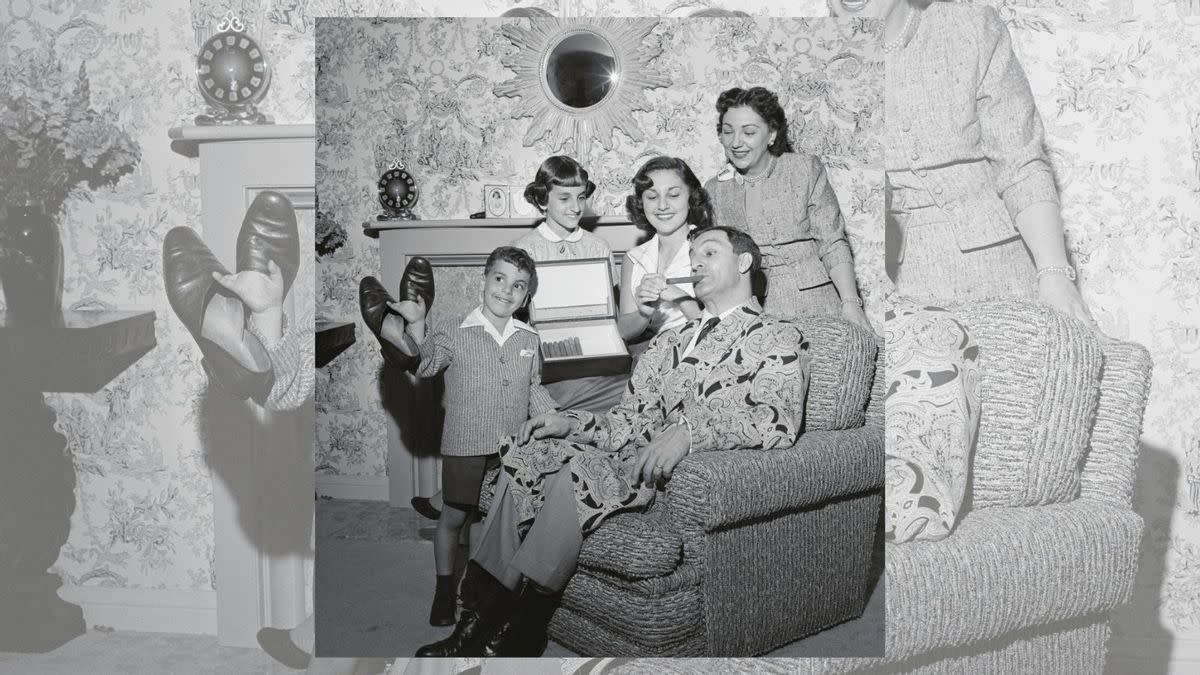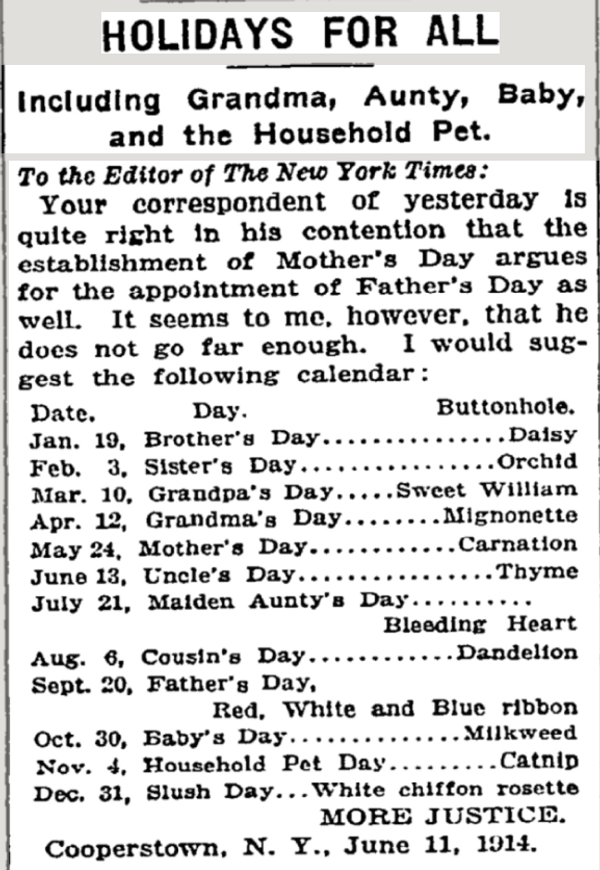The Origins and History of Father's Day

On the third Sunday of every June, Americans organize barbecues, gift-wrap ties and sign cards to celebrate everything dads do for their families. But one American mom, the late Sonora Smart Dodd, also deserves a moment of special recognition on that day. Formally established as a permanent national holiday in 1972, Father's Day as we know it today is in many ways a direct result of Dodd's self-proclaimed "obsession" with establishing an annual celebration of fathers.
Born in Arkansas in 1882, Dodd attributed the idea of an annual celebration of fatherhood to the deep respect she felt for two dads in her own life. The first was her father, William Jackson Smart, a Civil War veteran who raised Dodd and her five siblings as a single parent after their mother died in childbirth.
In her notes for a 1948 speech, now preserved in the special collections of Whitworth University in Spokane, Washington, Dodd wrote, "I would say that Father's Day really had its nativity back in 1898, when our home was bereaved and Father so courageously assumed the father-mother role."
Dodd's memories of her father's care for her and her siblings were so warm that in May 1909, when she heard a sermon delivered in honor of Mother's Day — which would become an official national holiday in 1914 — it was her father, not her mother, who came into her mind. When the minister finished his sermon, Dodd is reported to have walked up to him and said, "I liked everything you said about motherhood. However, don't you think fathers deserve a place in the sun, too?"
The other dad who inspired Dodd to campaign for a national Father's Day was her husband, who became a father when Dodd gave birth to their only child, Jack, in October 1909. As she wrote in her notes for the same 1948 speech, her husband's devotion to their son was "so evident [that] the idea of a special day for fathers became an obsession."
Working with local clergy and the YMCA in Spokane, where she and her family lived, Dodd succeeded in organizing a local Father's Day celebration for June 19, 1910. Over the following years, local Father's Day celebrations sprang up across the United States.
Not all Americans immediately embraced the idea of a nationally recognized holiday for dads, however.
One 1914 letter to the New York Times sarcastically suggested that if Americans were to adopt an official Father's Day, they might as well create holidays celebrating every member of the family, including Uncle's Day, Maiden Aunty's Day, and Household Pet Day.

(New York Times)
Another common criticism of the idea of an official national Father's Day was the holiday's perceived commercialism. As historian Timothy Marr explained in his entry on Father's Day in "American Masculinities: A Historical Encyclopedia," many American men saw Father's Day as "a commercial gimmick to sell more products— often paid for by the father himself."
This criticism grew even stronger during the Great Depression, when businesses began actively promoting the unofficial holiday in an attempt to bolster sales. By 1938, historian Ralph LaRossa wrote in his book "The Modernization of Fatherhood," retailers felt optimistic that they could turn Father's Day into "a second Christmas."
Concern over the commercialization of Father's Day persisted even after the federal government adopted the practice of passing annual resolutions acknowledging the holiday. In 1966, Russell B. Long, a U.S. senator from Louisiana, unsuccessfully tried to prevent the U.S. Senate from approving one such resolution, complaining that there was already too much "buying pressure on children to buy presents."
Despite the resistance to the idea of an annual, nationally recognized Father's Day, Dodd and her allies continued to actively campaign for the holiday for more than six decades until 1972, when President Richard Nixon signed a proclamation permanently designating the third Sunday in June as Father's Day nationwide.
On Feb. 16, 1972, only a few months before he signed the proclamation, Nixon sent a telegram to Dodd on the occasion of her 90th birthday acknowledging her role in establishing Father's Day as an official American holiday. The telegram, now part of the special collections of Whitworth University, reads,
As the father of two lovely daughters who have never forgotten Father's Day, I am grateful to you for beginning this great tradition in American life.
On your 90th birthday I hope that you may derive the greatest joy and satisfaction from the knowledge that families across the country have known such happiness because of the special day you inspired.
Dodd died in 1978 at the age of 96, having seen her six-decade-long dream of a permanent national Father's Day become reality.
Sources:
Carroll, Bret. American Masculinities: A Historical Encyclopedia. SAGE Publications, 2003.
Evon, Dan. "The Anti-War Origins of Mother's Day." Snopes, 6 May 2021, https://www.snopes.com//news/2021/05/06/origins-of-mothers-day/.
"Including Grandma, Aunty, Baby, and the Household Pet." The New York Times. TimesMachine, https://timesmachine.nytimes.com/timesmachine/1914/06/14/100320025.html. Accessed 12 June 2024.
LaRossa, Ralph. The Modernization of Fatherhood: A Social and Political History. University of Chicago Press, 1997.
Nixon, Richard. "Telegram to Sonora Dodd from Richard Nixon, February 16, 1972." Correspondence and Documents, Feb. 1972, https://digitalcommons.whitworth.edu/fathers-day-correspondence/183.
Proclamation 4127—Father's Day | The American Presidency Project. https://www.presidency.ucsb.edu/documents/proclamation-4127-fathers-day. Accessed 12 June 2024.
"Senator Long Fails to Stop Recognition of Father's Day." The New York Times. TimesMachine, https://timesmachine.nytimes.com/timesmachine/1966/06/14/80482833.html. Accessed 12 June 2024.
"Sonora Dodd; Urged 'Father's Day.'" The New York Times. TimesMachine, https://timesmachine.nytimes.com/timesmachine/1978/03/23/110811757.html. Accessed 12 June 2024.
"The Woman Who Founded Father's Day Was a Renegade, Great-Granddaughter Says." AP News, 18 June 2023, https://apnews.com/article/fathers-day-holiday-woman-sonora-smart-dodd-80a1ad216e0e6ed93a8a227bc380ba0d.
Unidentified. "'Father's Day, 1948,' Apparently Written by Sonora Dodd." Correspondence and Documents, Jan. 1948, https://digitalcommons.whitworth.edu/fathers-day-correspondence/131.

 Yahoo News
Yahoo News 
